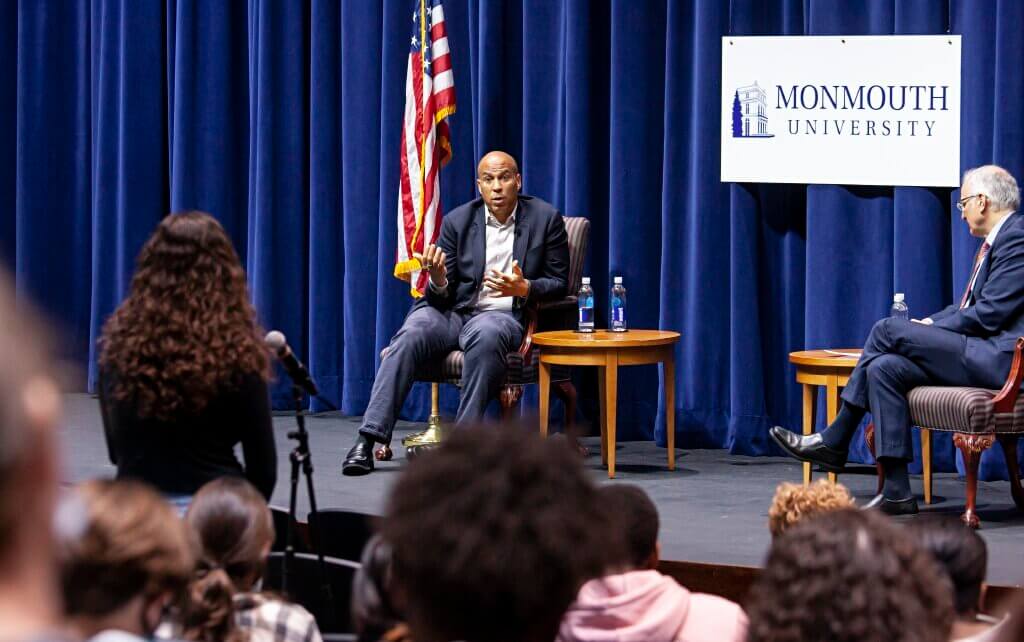U.S. Senator Cory Booker recently answered live questions from Monmouth students on a wide array of social and political topics on Wedensday, Oct. 13. The conversation, “Are Politics and Spiritual Values Compatible?” was moderated by Patrick Murray, director of the Monmouth University Polling Insitute.
Patrick Leahy, President of Monmouth University, introduced Booker, detailing how the senator completed his bachelors and masters degrees at Stanford. He was then awarded the Rhodes Scholarship, allowing him to study at the University of Oxford, before returning to the United States to complete his law degree at Yale.
“My point in sharing that [information] is this individual could have done anything at that point in his life, and he chose to move to inner city Newark to become a community advocate,” Leahy said. “Then a city council member and then ultimately, of course, mayor of Newark. His record as mayor of Newark is well defined.”
Next, Booker was asked a series of questions by Monmouth undergraduate students. Being a politician who is active on social media, Booker was questioned if he feels as though he needs to compete with other politicians in terms of engagement and if there is any pressure to over-sensationalize his posts in order to draw more attentions towards his brand.
Booker explained that he did a presentation in front of the democratic caucus, coaching fellow democrats on how to achieve higher levels of engagements, followers, and likes.
“I do not want to do things just to get followers,” Booker stated. “I really make a distinction in my life between celebrity and significance, between popularity and purpose.”
He then recalled reading his old journal, written 25 years ago when he was coming out of law school. Booker felt vindicated that the life purpose described in the journal has not changed.
“If you go on my Instagram right now and look at my stories, I’m talking about spirituality,” Booker said. “I’m talking about love and I connect that to policy… And so I have a purpose, and I want to stay relevant with that on my social media and not pander. [Yet], I try to continue to bring light, truth, and very importantly my own vulnerability.”
Booker hopes that all people understand the power they have with social media. “I think about the civil rights organizers of my parents’ generation and if they had social media… Please do an audit of your own social media. Is it full of trivialities, is it full of snark and cynicism, or do you recognize that if you’re using those platforms to encourage and show your own vulnerability, you can make changes that are multiple degrees of separation in ways that you can’t even fathom.”
Next, A’liah Moore, a senior communications student and Forward on the women’s soccer team, asked Booker a question regarding the American dream. She asked Booker to elaborate on his quote, “The American dream isn’t real for anyone unless it’s within reach of everyone,” and expand upon how we can make the American dream a reality from his perspective, as well as discuss some challenges he faces as an African-American politican trying to make progress.
“Maybe the best example of [something that] crushes the American dream for millions of people is the criminal justice system,” Booker said. “I’ll never forget knocking on thousands of doors to run for city council in 1998 and meeting family after family that had their lives and economic fortunes devastated because of convictions for low-level drug crimes.”
Just a few years ago, there were more marijuana arrests in the United States than all violent crime arrests combined, Booker said. He also stated the fact that black individuals are four times more likely to be arrested for marijuana than white individuals, despite no differences in rate of usage.
“Once you have that conviction, you can’t get a job or a loan from a bank,” Booker said. “The American Bar Association points to 40,000 collateral consequences if you’re an American with a criminal conviction. That has impoverished entire communities because the War On Drugs has been a war on people. That is devastating to this American dream and abjectly unfair.”
Sofia Iannuzzo, a senior communicators major, asked Booker if women becoming more active in politics has widened or reshaped his ideas and ideologies.
Booker recalled that throughout his life experiences, including growing up in a household with a positive feminist mother and experiences in college, he was led to incredible women that were always expanding his empathy, making him more aware, and creating a champion out of him for issues of justice as it relates to women and others.
He is on the United States Senate Committee on Foreign Relations, which is made up of 21 men and 1 woman, being Senator Jeanne Shaheen.
“When I sit in committees [that are] talking about issues such as family planning or abortion… debating issues of paid family leave or affordable child care, and it’s mostly men who often haven’t had to bare the weight completely of these issues, it’s problematic that we don’t have more people with lived experience who are actually the decision makers at the table.”
Ahmad Brock, an undergraduate student, asked Booker how he deals with with the stress of bipartisan gridlock and opposition from republican colleagues in the senate.
“I deal with it by not demonizing my Republican colleagues,” Booker said. “I deal with it by trying to create real relationships with them so that I can get things done. New Jersey did not send me to the Senate to be a great democratic senator, they sent me to be a great senator that delivers for my state.”
Booker is proud that despite being a “junior” in the senate, he has accomplished much for his state and nation as a result of working with republican partners on the other side of the aisle.
“It is so easy just to hang out with people like you, who think like you, who affirm how brilliant your opinions are about the world, but I am telling you that is a shallow life,” Booker said. “It will limit your ability to create the deeper community that America urgently needs.”
Scharina Bencosme, an English major, asked Booker how with homophobia often being excused under the justification of religious beliefs, or lack thereof, how does he, as a political figure, attempt to elevate the voices of women, non-binary, and LGBTQ+ individuals within his staff. She also asked what steps are taken in Booker’s everyday work to include intersectional perspectives that may not be supported by religious institutions.
“The first thing I do is make sure that my office represents the state that I represent,” Booker said. “We’ve been very conscious of that. I’ve had four chiefs of staff since I’ve been a United States senator; three of them have been women. As a leader of my office, focusing on issues of diversity, whether it’s LGBTQ, gender, race, religion, people who are differently-abled, all these things are in the consciousness I have of my team-building.”
As far as Booker’s professional life goes, he makes sure that diverse groups are always informing the priorities of his office, as well as the issues they are trying to champion.
“As we live in a country that is still so struggling with these issues, I hope that you and I both can find ways to help expand people’s consciousness on these issues through our own experiences and willingness to be vulnerable.”
A student then asked Booker how he would balance people’s religious and non-religious views with abortion laws and reproductive rights, as well as what some of his personal thoughts are on the laws regarding religion and his own personal biases.
Booker recently was involved in a hearing on the Texas abortion law, which bans procedure as early as six weeks into a pregnancy. He believes that abortion care is health care, and “these are the most diffiuclt decisions [that] should not be made by government,” but rather by a woman.
“I have very strong, cemented beliefs on these issues,” Booker said. “But, I still wanted to listen with love to my [republican] colleague and my friend. It was clear to me that his cemented views come from the fact that he thinks life starts at conception. Now, I’m a Christian, and I can cite you biblicial phrases about when life starts, but we have just a different view but I listen with love.”
When it was Booker’s time to speak on the bill, he made affirmative statements that the law in Texas was not an attack on abortion, but rather an attack on low-income women.
“If you’re wealthy in texas, you’re going to find a way to get an abortion,” Booker said. “This was yet another attack on low-income women in america. Then, I said, ‘is there something that we can unite around?’”.
Booker expressed his frustration that if ones’ goal is to lower the number of unwanted pregnancies, why can we not assess the facts of how that has been achieved in the country.
“Colorado lowered their rates of abortion for young women by 40 percent,” Booker said. “They didn’t pass restrictive abortion laws. What they decided to do was to empower women and give free access to birth control and IUDs to low-income women. There are things we know factually lower the rates of unwanted pregnancies.”
Students continued to ask Booker questions before the allotted period of time ended. “I just want to thank you,” Murray said. “You’re often not appreciated at home but you are a national figure who is really respected in the country for the work that you do.”




